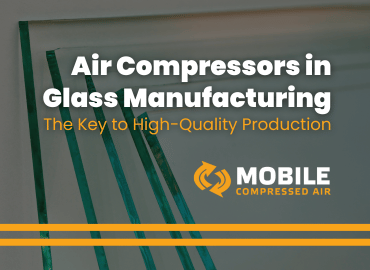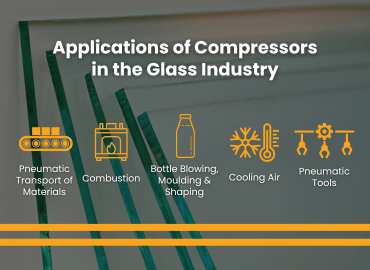Air Compressors in Glass Manufacturing: The Key to High-Quality Production
The art of glass manufacturing has evolved significantly over the centuries, and one of the pivotal factors in its modern-day success is the use of compressed air. Compressors are integral to industrial glass manufacturing, including the production of containers, bottles, flat glass, and specialised products such as fibreglass, bulbs, and tubes. This article aims to give manufacturers a comprehensive understanding of air compressors in the glass industry, enabling them to make well-informed decisions to enhance production efficiency and quality.
Compressed Air in Glass Manufacturing
Compressors provide the power and precision needed for a range of applications in the glass industry, from the initial steps of manufacturing, such as the transportation, mixing, and melting of materials, to the final stages of quality control, including the shaping and finishing of products.
Applications of Compressors in the Glass Industry:
- Pneumatic Transport of Materials: Compressed air systems enable the pneumatic transport of materials, ensuring a quick and efficient flow from silos to the production line.
- Combustion (Melting and Mixing): In the glass melting furnace, air compressors provide a consistent and regulated airflow to assist in mixing and melting the raw materials. This process guarantees a uniform mixture, which is vital for the quality and integrity of the final glass product.
- Bottle Blowing, Moulding and Shaping: Compressed air is used to shape the molten glass into bottles, sheets, or other forms. The precision and control afforded by air compressors at this stage are crucial for achieving the desired dimensions, thickness, and quality of the glass products.
- Cooling Air: After the glass objects are formed, the cooling rate must be carefully controlled to set their shape and ensure durability. Compressed air is used in the annealing process or to harden sheets by reducing the temperature of the glass. This step is critical for maintaining structural integrity and the long-term performance of the glass products.
- Pneumatic Tools: Compressors power a variety of machinery essential to glass manufacturing processes, including glass cutting, applying coatings, packaging, and dust removal.
Air Compressors Air in Glass Bottle Production
Compressed air is used in several stages to produce glass bottles or containers. Initially, compressors power the transport and facilitate the mixing and melting of raw materials. Critically, in the bottle blowing process, compressed air is used to inflate gobs (molten glass preforms) inside moulds, giving them their distinct shapes and sizes. This stage requires precise control over the air pressure to ensure that each bottle meets the required specifications for volume, thickness, and appearance. Following the moulding process, compressed air is needed to cool, finish and coat the bottles, preparing them for inspection, packaging, and distribution.
Air Compressors Sheet Glass Manufacturing
Sheet glass production is another area within the glass industry that relies heavily on compressed air. The initial stages are similar to glass bottle production; however, the shape and moulding processes differ. Critically, once the glass is molten, compressed air is needed to move the glass along the conveyer in the float glass process. This is where molten glass is floated on a bed of molten tin blocks to create a flat surface and remove irregularities. During the cooling phase, compressed air is used to cool the sheet efficiently, preventing internal stresses and flexibility. This process ensures that the glass solidifies straight and uniformly so that it’s ready for cutting.
Types of Compressors Used in Glass Manufacturing
Choosing the right type of compressor for glass manufacturing is crucial, given the varied demands of different glass production stages. Rotary screw compressors are well-suited for the glass industry, ideal for both glass sheet and glass bottle production. They are valued for their consistent performance and energy efficiency, which align well with the operational demands of glass production. Read more about the different types of compressors here.
Factors Influencing Compressor Selection in Glass Manufacturing
Selecting the right compressor involves several considerations:
- Air Quality: High-quality, contaminant-free air is crucial in maintaining the integrity of glass products.
- Energy Efficiency: With significant energy demands in glass production, choosing an efficient compressor can substantially reduce operational costs.
- Durability and Maintenance: Given the harsh environments of glass manufacturing, compressors must be robust and easy to maintain.
Selecting the Right Compressor for Different Glass Manufacturing Applications
Each stage of glass production may require different compressor capabilities:
- Melting and Mixing: High-volume air compressors that can deliver consistent pressure for melting raw materials.
- Moulding and Shaping: Precise control over air pressure is critical to achieve the desired product specifications.
- Cooling and Finishing: Compressors that can adjust airflow to control the cooling rates for glass products, ensuring their durability and quality.
Final Thoughts
The choice of an air compressor for glass manufacturing should be based on a thorough understanding of the specific requirements of your production processes. Considerations such as air quality, energy efficiency, and the specific demands of different production stages are crucial.
If you’re looking for expert advice on selecting and maintaining the perfect compressor system for your glass manufacturing needs, Mobile Compressed Air is here to help. As a leader in providing industrial compressors in Adelaide and across South Australia, we specialise in customised solutions tailored to the unique needs of the glass manufacturing industry. Trust us to enhance your production efficiency with reliable, high-quality compressed air solutions.
Contact Mobile Compressed Air today to ensure your glass manufacturing processes benefit from the best in compressed air technology.


